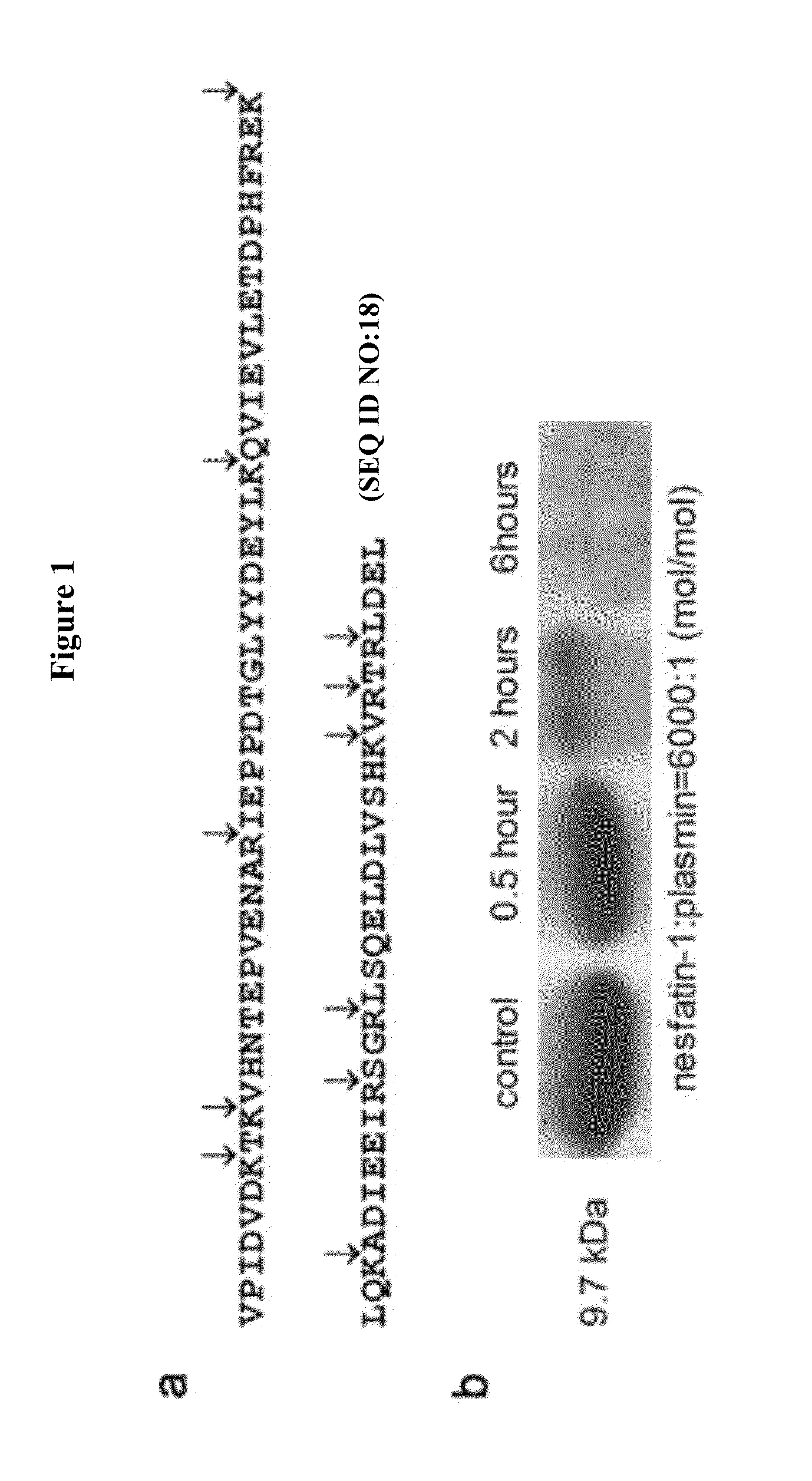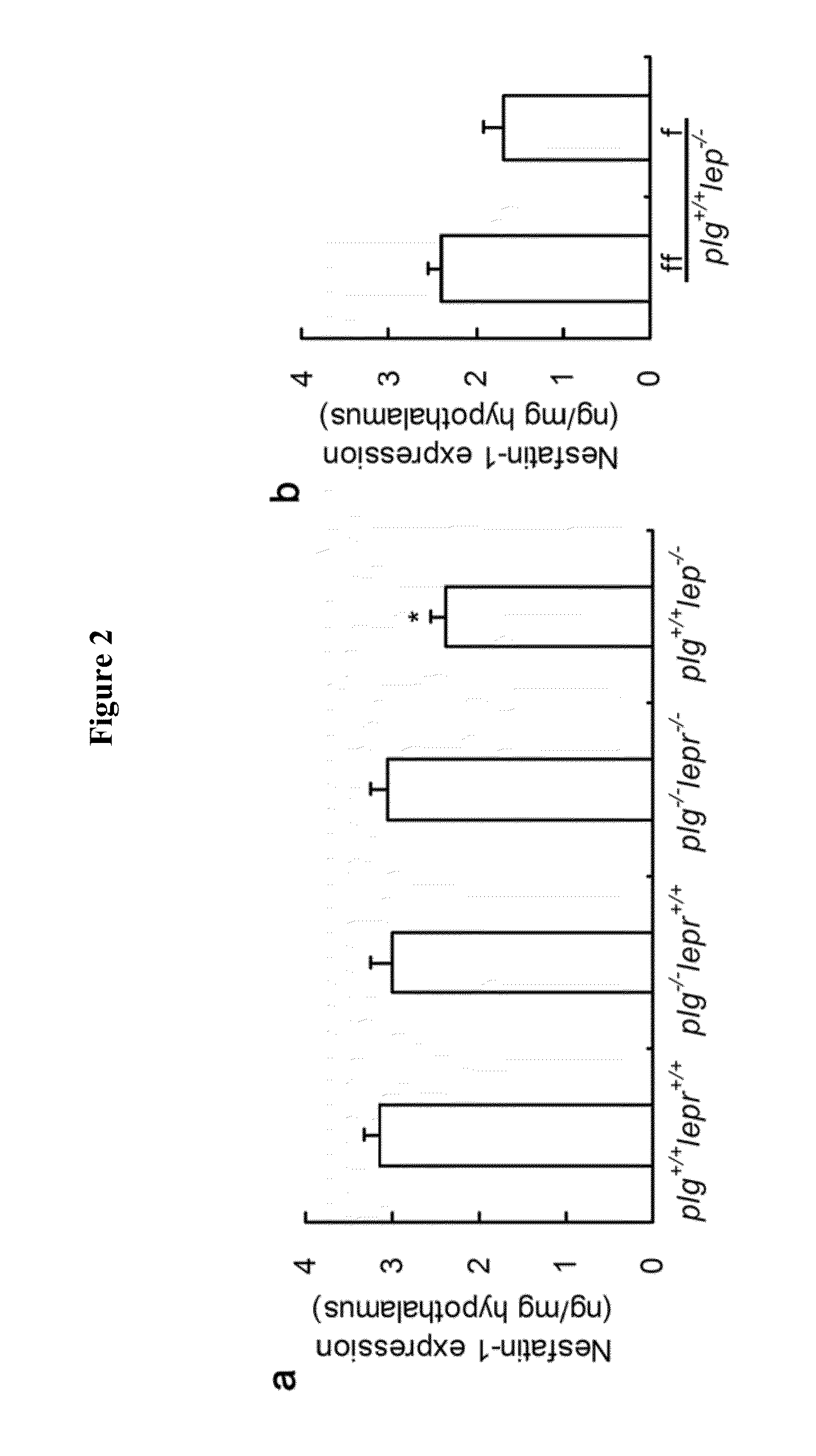Plasma Anti-diabetic NUCB2 peptide (pladin) and uses thereof
- Summary
- Abstract
- Description
- Claims
- Application Information
AI Technical Summary
Benefits of technology
Problems solved by technology
Method used
Image
Examples
example 1
Nesfatin-1 Mediates the Effects of Plasminogen in Obese and Diabetic Animals
[0048]Nesfatin-1, a postulated secreted fragment of NUCB2, has been recently identified as an anorexigenic factor associated with melanocortin signaling in hypothalamus. The intracerebroventricular (i.c.v.) or i.p. injection of nesfatin-1 inhibits food intake and thereby reduces body weight. Carefully examining the amino acid sequence of nesfatin-1, it is highly conserved from mouse to human and has several putative cleavage sites by plasmin (FIG. 1a). Therefore, it was postulated that nesfatin-1 could mediate the effect of plasminogen in obese and diabetic animals.
[0049]To prove this assumption, recombinant nesfatin-1 was expressed and purified from genetically engineered E. coli. It was then incubated with plasmin and rapidly degraded as expected (FIG. 1b). Intriguingly, hypothalamic nesfatin-1 was found significantly less in plg+ / +lepr− / − than their non-obese littermates included plg− / −lepr− / − (FIG. 2a), ...
example 2
The Effect of Intravenous Injection of Plasmin Inhibitor on Blood Nesfatin-1
[0055]It is unknown how nesfatin-1 is cleared from circulation. The tiny amount of plasmin generation in periphery was previously reported and confirmed in the study (data not shown). AMCA and aprotinin, two inhibitors of plasmin, was i.v. injected to db / db. The reduction in food intake and body weight was seen while circulating nesfatin-1 was increased (FIG. 5). The i.v. nesfatin-1 also cleared much slower in plg− / − than plg+ / + (data not shown). Therefore, peripheral nesfatin-1 was believed at least partially to be degraded by plasmin. Consistent to the report that nesfatin-1 penetrated BBB without saturation, the anorexigenic effect of AMCA suggested that peripheral nesfatin-1 was at least in-part of the source of cerebral nesfatin-1. Since nesfatin-1 was found to affect rats neuropsychologically as evidenced by increasing anxiety and fear-related behaviors, albumin-nesfatin-1 fusion protein were made effe...
example 3
Quantitative PCR Assay for Neuropeptides
[0057]The neuropeptide mRNA was measured using quantitative PCR (q-PCR), using CFX96TM Real-Time System (Bio-Rad, Hercules, Calif.) and the SYBR Green I detection method. Briefly, hypothalamic tissues from 24-hour fasted mice were homogenized, and total RNA was extracted using RNAiso Reagent (TaKaRa, Dalian, CN) and then reversed to single-strand cDNA. The relatively expression of neuropeptide mRNA was determined using the standard curves of hypothalamic cDNA, and adjusted for total RNA contents with gadph RNA by qPCR. Primers for real-time RT-PCR were used as follows: agrp forward primers: 5′-TGT GTA AGG CTG CAC GAG TC (SEQ ID NO:10); agrp reverse primers: 5′-GGC AGT AGC AAA AGG CAT TG (SEQ ID NO:11); agrp Tm: 61° C.; npy forward primers: 5′-AGG CTT GAA GAC CCT TCC AT (SEQ ID NO:12); npy reverse primers: 5′-ACA GGC AGA CTG GTT TCA GG (SEQ ID NO:13); npy Tm: 61° C.; pomc forward primers: 5′-CGC CCG TGT TTC CA (SEQ ID NO:14); pomc reverse prime...
PUM
| Property | Measurement | Unit |
|---|---|---|
| Molecular weight | aaaaa | aaaaa |
| Plasma power | aaaaa | aaaaa |
Abstract
Description
Claims
Application Information
 Login to View More
Login to View More - R&D
- Intellectual Property
- Life Sciences
- Materials
- Tech Scout
- Unparalleled Data Quality
- Higher Quality Content
- 60% Fewer Hallucinations
Browse by: Latest US Patents, China's latest patents, Technical Efficacy Thesaurus, Application Domain, Technology Topic, Popular Technical Reports.
© 2025 PatSnap. All rights reserved.Legal|Privacy policy|Modern Slavery Act Transparency Statement|Sitemap|About US| Contact US: help@patsnap.com



